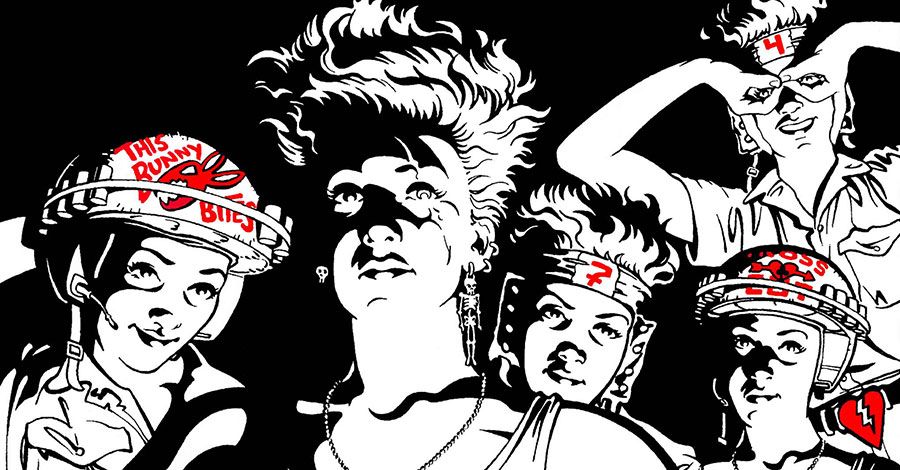The Female Heroes: Then and Now panel was one of a number of Comic-Con International 2014 programs devoted to women in the industry. Panelists, including "Heartbreakers" creators Anina Bennett and Paul Guinan, Kiala Kazebee ("Vaginal Fantasy"), Jimmy Palmiotti ("Painkiller Jane," "Harley Quinn"), Allison Baker (Monkeybrain Comics) and Claire Hummel ("Bioshock Infinite").
The panel, in part, was a celebration of the 25th anniversary of Bennett and Guinan's "Heartbreakers," the first ever comic to feature a female action star. Not content with typical super-hero offerings, a young Guinan was drawn to the character Ripley from the "Aliens" film franchise.
"There were these two films with this amazing female character, kicking ass," Guinan recalled thinking at the time, "but there's nobody like that in comics." Guinan wanted to create that same excitement and thrill, but with ink and page. With his wife Anina Bennett as a writing partner, Dark Horse took a chance and released the story in "Dark Horse Presents" #35.
A lot has changed in the comics industry since "Heartbreakers'" debut. As Bennett jokingly pointed out, when "Heartbreakers" premiered back in 1989, there were no lines in the women's bathrooms at Comic-Con. The Internet has also made content accessible to a wider audience, while providing and avenue for the female voice to be heard. Despite the gains, the panelists cautioned that challenges remain. Creating well-drawn, complex female protagonists in an industry where female characters tend to be role-fillers, archetypes, or otherwise one-dimensional can be difficult.
Hummel emphasized the importance of making female characters human, and not just some archetype. "I like rounded, interesting, female characters. Like they've been written as a whole person, not just to fill a roll." She explained further, "I don't necessarily need all my women to be powerful and badass. I love that Sansa [Stark, from "Game of Thrones"] plays the slow game; I love heroines who are timid and realistic and rounded."
The effort to increase the level of female diversity is something that "Bioshock Infinite's" Claire Hummel is intimately acquainted with. "We were working on different [female] body archetypes for a game... and so I sent over a set of full-spectrum of heavy females. Of course they want the least heavy. But their response [to the rest] was, 'Well I wouldn't take her home at night,'" said Hummel. "You should not be driven by your sexual preferences in character design."
Despite such experiences, the landscape continues to change. Announcements regarding more prominent female characters (such as the female Thor reboot) are encouraging. Though, panelists caution that they should be met with some scrutiny.
"[Marvel Comics has] said they're going to make Thor a woman, but at the same time, Marvel has very, very few female creators working for them... so it sort of comes up like a marketing ploy, and not really a sincere effort to broaden their horizons," Bennett said.
Still, publishers are making more efforts to diversify both on and off the page. Jimmy Palmiotti, one half of the writing team for "Harley Quinn", shared that having his wife Amanda Conner as a writing partner has been key to their success. Remembering early planning conversations with Conner, Palmiotti recalled her saying, "You can work the stories but I need to do the final dialogue, because I can hear her voice."
Over time, Palmiotti and Conner have developed a collaborative style that works well for them. "[I ask myself] what's the strongest thing that I do, and we divide it right there. As a team we're a pretty good machine," said Palmiotti.
When asked about continuity problems on "Harley," Palmiotti said, "The idea that it's out of continuity and its still selling ... is a great sign that there's an audience for something besides the straight superheroes." He reiterated that the fan base for "Harley" is largely women.
Despite more husband and wife writing teams like Palmiotti/Conner and even David and Meredith Finch ("Wonder Woman"), the number of women working in the industry remains low, but Monkeybrain Comics' Allison Baker said representation was one of the most important things moving forward.
"The problem is that the majority of people in charge are white men," said Baker. "It's like a rut, where [editors] are just going to people they know... its important to see that women and people of color are working in the field so other people will maybe think that that is something they can do in the future. It's super important -- the visualization and the representation of showing that different people work on all different kind of things."

